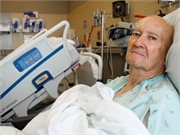Very low-certainty evidence from two studies shows sitters reduce patient falls in acute care hospitals
FRIDAY, Feb. 7, 2020 (HealthDay News) — There is a lack of evidence to suggest that adding bedside sitters to usual care prevents falls for patients in acute care hospitals, according to a review published online Feb. 4 in the Annals of Internal Medicine.
Adela M. Greeley, M.D., from the University of California in Los Angeles, and colleagues conducted a systematic review to examine the effect of sitters and alternatives to sitters on patient falls in acute care hospitals. Data were included for 20 studies; two of the studies added sitters to usual care, and 18 compared alternatives to sitters. All of the studies had at least one methodological limitation.
The researchers found that adding sitters reduced falls based on very low-certainty evidence provided by two studies. Moderate-certainty evidence was provided in eight studies that interventions such as video monitoring reduced sitter use and either had no effect or reduced the number of falls. Interventions that included nurse assessment tools (three studies) or a close observation unit (two studies) were effective alternatives to sitters based on very low-certainty evidence.
“Despite the lack of evidence, the rationale for the use of sitters to prevent falls is compelling, and it seems premature to conclude that their use should be abandoned,” the authors write. “The evidence is most consistent with the conclusion that, at best, any effect of sitters on fall risk is modest.”
Copyright © 2020 HealthDay. All rights reserved.








